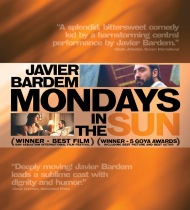|
Mondays in the Sun
aka Los lunes al Sol
|
| |
 |
Spanish language. Spain, 2002. Rated R.
113 minutes.
Cast:
Javier Bardem, Luis Tosar, José Ángel Egido, Nieve de Medina, Enrique
Villén, Celso Bugallo, Joaquín Climent, Aida Folch, Serge Riaboukine,
Laura Domínguez, Andrés Lima
Writers: Fernando León de Aranda, Ignacio del Moral
Music: Lucio Godoy
Cinematography: Alfredo F. Mayo
Producers: Elías Querejeta, Jaume Roures
Director: Fernando León de Aranda
LINKS
|
 he
winner of five Goya Awards and the top prize at the San Sebastian film festival,
Mondays in the Sun comes to us from Spain highly decorated and highly
recommended. Set in an economically depressed port on Spain's north coast, Mondays
in the Sun cinematically recreates the despair of being aimlessly and chronically
unemployed. Part sophisticated drama, part pro-union remonstration, Mondays
in the Sun observes the efforts of a group of laid-off shipbuilders to survive,
weaving its near-invisible threads so subtly that the pattern is indiscernible
until the film approaches its conclusion. Mondays in the Sun is perfectly
crafted and an unabashedly emphatic left-wing statement.
he
winner of five Goya Awards and the top prize at the San Sebastian film festival,
Mondays in the Sun comes to us from Spain highly decorated and highly
recommended. Set in an economically depressed port on Spain's north coast, Mondays
in the Sun cinematically recreates the despair of being aimlessly and chronically
unemployed. Part sophisticated drama, part pro-union remonstration, Mondays
in the Sun observes the efforts of a group of laid-off shipbuilders to survive,
weaving its near-invisible threads so subtly that the pattern is indiscernible
until the film approaches its conclusion. Mondays in the Sun is perfectly
crafted and an unabashedly emphatic left-wing statement.
It's also as boring as a trip across Kansas on a Greyhound bus.
Mondays in the Sun is an example of what can happen when a film functions
exclusively on the intellectual level. Thinking about it as a film-school professor
might, it is impossible to find fault, but on the emotional, gut level, Mondays
in the Sun fails utterly to connect. It's an academic exercise. There's
a perfectly good artistic reason for the lack of spirit—most of the characters
have had their spirit mercilessly crushed out of them, and the film wants to
place itself in their shoes. The presence of a good reason, however, doesn't
make the film any less listless.
Director Fernando León de Aranda has concentrated too much on creating the
right atmosphere and making the desired political points. The whole film is
built around a polemical outburst by irreverent Santa (Javier Bardem), a flawed
but unbowed man who has made a crusade out of defying court orders to pay for
a fifty-dollar street lamp he broke during a riot. It's an impressive speech.
 Though
angry and bitter, it is vigorous, cogent, and well-argued, making discredited
(according to conventional wisdom) pro-labor, quasi-communist ideals sound fresh
and inspirational. It's more of a lecture from the filmmaker than a scene, but
because of its fervor, it's actually the moment in which the film speaks most
strongly to the audience.
Though
angry and bitter, it is vigorous, cogent, and well-argued, making discredited
(according to conventional wisdom) pro-labor, quasi-communist ideals sound fresh
and inspirational. It's more of a lecture from the filmmaker than a scene, but
because of its fervor, it's actually the moment in which the film speaks most
strongly to the audience.
A few other moments in Mondays in the Sun stick out, like when Lino
(José Ángel Egido) fights age discrimination by coloring his hair, only to have
the color begin to run down his neck right before he's called in for his job
interview. The story arc involving Amador (Celso Bugallo), an older drunkard
who has long given up, also becomes compelling when Santa realizes Amador represents
the younger friends' future.
The immensely talented Bardem stands tall as Santa, demonstrating a gift for
both physical and psychological makeovers. Having played an passionate homosexual
poet through several stages of life in Before Night Falls and a reserved
government functionary full of repressed yearning in The Dancer Upstairs,
Bardem appears here heavier, bearded, and sporting a receding hairline (unfortunately
a rather obvious shave job). Though he is just a member of a capable ensemble
cast, he effortlessly commands the film without diminishing the other characters.
On the whole, however, Mondays in the Sun is a film about indirection
and fragmentation that comes across as indirect and fragmented. Nor are Aranda's
characters as heroic or self-aware as he seems to think they are (and has said
they are). Rather, they seem trapped in time, languid and lost. There's a difference
between a hero and a victim of circumstance. A hero rises above his circumstances
against the odds, or at the very least copes with them. These characters do
not do that, and the ending offers no hope that they will. This is, after all,
a political film. If they could change their circumstances, then there would
be no need for others to care and intervene.
Mondays in the Sun fulfills all the traditional criteria for a Serious
Movie—the ones that specify that a film should be important, should tell
the truth, and should serve a purpose. Viewers who have such rigid ideas about
what constitutes worthwhile cinema will no doubt love Mondays in the Sun.
But those who don't enjoy films based on a clinical evaluation of merit may
find their Mondays in the Sun to be hazy and overcast.
Review
© July 2003 by AboutFilm.Com and the author.
Images © 2003 Lions Gate Films. All Rights Reserved.

 Though
angry and bitter, it is vigorous, cogent, and well-argued, making discredited
(according to conventional wisdom) pro-labor, quasi-communist ideals sound fresh
and inspirational. It's more of a lecture from the filmmaker than a scene, but
because of its fervor, it's actually the moment in which the film speaks most
strongly to the audience.
Though
angry and bitter, it is vigorous, cogent, and well-argued, making discredited
(according to conventional wisdom) pro-labor, quasi-communist ideals sound fresh
and inspirational. It's more of a lecture from the filmmaker than a scene, but
because of its fervor, it's actually the moment in which the film speaks most
strongly to the audience.
